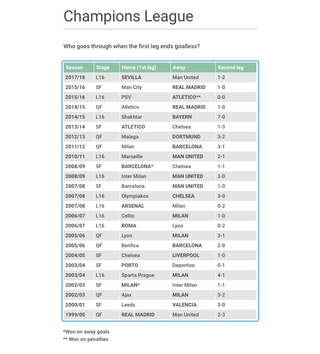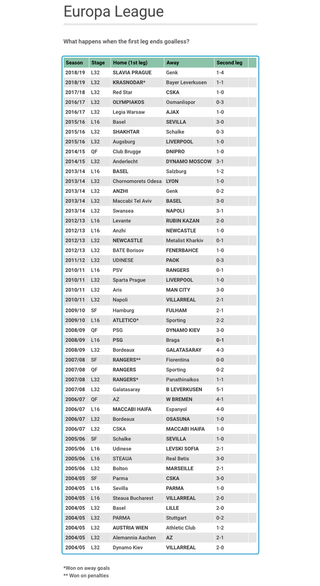Who goes through most often when the first leg in Europe finishes 0-0?
Liverpool have it all to do in their Champions League last-16 second leg at the Allianz Arena – but what does history tell us about their chances? FFT’s Joe Brewin digs in...

Sometimes, it’s hard to know exactly who a goalless draw in the first leg of a European tie works out best for.
With away goals in play – at least for now – there’s that age-old toss-up between denying your opposition a precious strike away from home turf, but knowing you (probably) need to score when the going gets tougher in your reverse fixture on the road.
Since 2000, only one club in the Champions League has managed to get through by not scoring at all, when Atletico Madrid saw off PSV on penalties in 2017/18 after back-to-back goalless draws and extra time.
Liverpool will be hoping for an altogether less nail-biting experience despite having failed to edge out Bayern Munich in their last-16 first leg at Anfield; a result Jurgen Klopp called “not perfect, but good enough to work with”. Unlike a 1-1, then, perhaps 0-0 is as much a 50-50 as you can get when it comes to two-legged knockout football.
Or is it? Rather than leave the imagination to curious assumptions, we’ve done some digging back to 1999/2000 (or 2003/04 in the UEFA Cup/Europa League, before a format change) and discovered the likelihood of home/away teams making it through after a scoreless score draw in the first leg.
And the results are in...
It's worth noting that data for the first knockout games of the Champions League (last 16) and Europa League (last 32) is skewed somewhat by teams being seeded by group finish at that stage, but the results show a clear trend between both competitions – your chances of ousting the other lot are significantly better if you were the away team first.
Get FourFourTwo Newsletter
The best features, fun and footballing quizzes, straight to your inbox every week.
In the 25 completed Champions League first legs that have ended 0-0 since the turn of the millennium, 15 (60%) have ended with a home win in the second, although that figure dips ever so slightly (58%) if you take out Atleti’s aforementioned shootout success (which you should, really).
Interestingly, only two of those ties – Barça’s ill-tempered win over Chelsea in 2008/09, and Milan’s semi-final success over rivals Inter in 2002/03 – were settled by away goals.

It’s a very similar story in the Europa League, too, although the correlation is even stronger. Of the 49 completed ties that have ended goalless at half-time, 31 (63%) go to the second leg’s home team.
Again, take away one of those for Rangers’ penalties victory over Fiorentina in the 2007/08 semi-finals and the ratio actually increases. In fact, the Gers’ run to the final that year defied odds: three of their knockout wins came after first-leg 0-0s when they were the home team (over Panathinaikos in the last 32 and Sporting in the quarters).
Relatively, even fewer of these UEFA Cup/Europa League matches analysed were decided on away goals – three of the 47 coming via Rangers (gah!), Atletico Madrid (in their run to victory in 2010, against Sporting in the quarters), and Krasnodar against Bayer Leverkusen this season.

Of course, there's a caveat to all of the above. The data doesn’t take into consideration relative strength of teams, never highlighted better than Bayern Munich’s last-16 meeting with Shakhtar Donetsk in 2014/15. After a nil-nil in Ukraine, Bayern duly hammered their hapless opposition 7-0 in the return leg.
Such a fate is unlikely to befall Liverpool unless their squad is afflicted by an outbreak of polydactylism (or something), but history won't be on their side when they head to Munich for round two.
NOW READ... Madrid, Milan, Manchester and... Marseille? Liverpool's 7 best Champions League away performances
OR... How Lionel Messi finally became the player he was expected to be (no, really)
Joe was the Deputy Editor at FourFourTwo until 2022, having risen through the FFT academy and been on the brand since 2013 in various capacities.
By weekend and frustrating midweek night he is a Leicester City fan, and in 2020 co-wrote the autobiography of former Foxes winger Matt Piper – subsequently listed for both the Telegraph and William Hill Sports Book of the Year awards.
